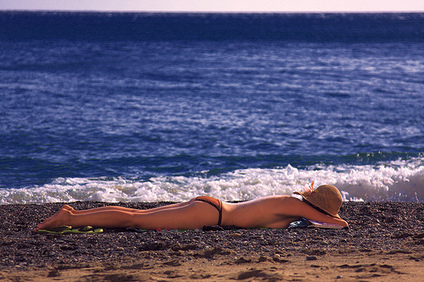Sunscreen’s importance is being called into question
We’ve got about one month left to soak up the summer sun, so let’s talk about sunscreen. Gisele sparked major controversy last summer when the Brazilian supermodel said, “I cannot put this poison on my skin. I do not use anything synthetic.”
While experts were outraged then, now it looks like more experts are questioning the efficacy of sunscreen in fighting skin cancer. They aren’t, however, questioning that sunscreen does indeed protect from sunburn. The National Cancer Institute, a branch of the NIH, says on its website that studies on sunscreen use and cancer rates have provided “inadequate evidence” that sunscreens prevent skin cancer.
Further, some sunscreen ingredients could actually cause other forms of cancer. We have advocated chemical-free skincare before, and the same logic goes for sunscreen: some ingredients in sunscreen are chemicals applied directly to skin, which are absorbed by the body and can cause potentially harmful mutations in cells. We’d rather just avoid these chemicals. The two most common and potentially harmful sunscreen ingredients are retinyl palmitate, which can break down into a harmful free radical, and oxybenzone, which may be a hormone disruptor.
The Basics of Sun Protection
Much of the debate comes down to the differences in UVA and UVB rays, which the FDA is only beginning to regulate, with labeling requirements that go into effect this December. Of the currently-approved FDA active ingredients, nine block UVB rays, three block UVA, and five block both.
Emily Elert of Discover Magazine writes: “The way sunscreen’s effectiveness is measured—its SPF rating—basically only describes its ability to block UVB rays. That’s because UVB is the main cause of sunburn, and a sunscreen’s SPF stands for how long you can stay in the sun without getting a sunburn (a lotion that allows you to spend 40 minutes in the sun rather than the usual 20 before burning, for example, has an SPF of 2).
UVA rays can cause cancer but not sunburn, so they don’t factor into the SPF calculation. That means that if you slather on a high SPF sunscreen that only protects against UVB, you’d still absorb lots of UVA radiation, potentially increasing your long-term cancer risk.”
Cancer Risk
Tthere isn’t clear evidence that sunscreen is effective in reducing the risk of skin cancer. There also isn’t clear evidence that it isn’t effective. Since the verdict on sunscreen and skin cancer is out, you have to make the best decisions for yourself. Keep in mind other factors as well: genetic predisposition to skin cancers, application—you probably don’t apply your sunscreen as thick as the manufacturers test it, and the type of sunscreen—physical versus chemical.
If You’re Going to Sunscreen:
Avoid: (chemical) retinyl palmitate; oxybenzone
Look for: (considered “physical”) titanium dioxide for UVB protection; zinc oxide and avobenzone for UVA protection
Or try these alternatives: Covering up when you’re in the sun with clothing, hats, sunglasses, and umbrellas; and, like Gisele, avoiding the sun at its peak strength prevents both sunburn and the potential for skin cancer.
Image: Some rights reserved by Vassil Tzvetanov

